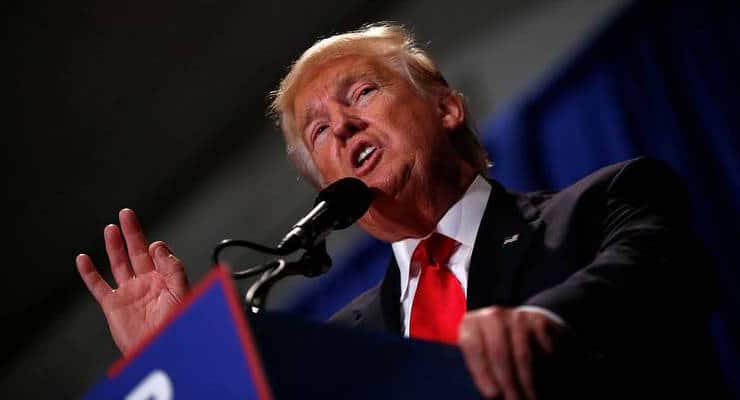

Republican U.S. presidential nominee Donald Trump speaks at a campaign rally at Blair County Convention Center in Altoona, Pa. (PHOTO: REUTERS)
It’s late August, the campaign clock is ticking. Donald Trump’s poll numbers are down – and not just by slim margins – and Hillary Clinton’s camp has all but locked up the race.
So the story goes, anyway.
But Donald Trump, if nothing else, is a competitor. His entire campaign has been marked by detractors, scoffers, mockers, predictors of gloom, declarers of doom, prognosticators of losses and more losses – and yet, in the end, the candidate’s steadfastly risen to the top. The smart voter, the savvy pundit, ought not close the door on a Trump administration just yet.
Guessing in August which candidate will win in November is nearly as impossible as predicting the Second Coming – and that’s not even based on polls. That’s just common sense. Why? Polls are snapshots in time, fickle by nature. They’re also about as scientific as climate change modeling, with outcomes that depend largely on the data that’s inputted. A poll that queries, “If the election were held today, would you vote for Hillary Clinton or Donald Trump,” is going to bring a lot different results than one that poses 10 questions about platforms, policies and issues and then asks, after each, “Which candidate, Hillary Clinton or Donald Trump, would do the best job” on the particular topic. Heck, polls are so persnickety that even the order of the candidates during the presentation of the question, or the phrasing – the inquiring, for example, of which would prove more “successful” versus “do a better job” — influences the respondents and therefore, the results.
Historically speaking, polls just aren’t always what they’re cracked up to be.
U.S. News & World Report wrote in September 2015, in a piece bluntly titled, “The Problem With Polls,” how Mitt Romney was supposed to beat Barack Obama, then-Senate Minority Leader Mitch McConnell was supposed to lose to political upstart Alison Lundergan Grimes and Scots weren’t all that decided on whether to declare independence from Great Britain – all according to separate surveys at the time. Well, how wrong the pollsters were, leading the news outlet to conclude “public opinion polls have racked up a few big-time fails in recent years, embarrassments that compelled a leading firm to conduct an internal audit to find out what went wrong.
Yet here we are, a year later, gasping a collective breath about what MSNBC reports: “Latest polls reinforce Republicans’ sense of dread.” Fox News hosts and pundits Eric Bolling and Dana Perino gave a real-time sense of what this supposed dread’s all about during a recent televised discussion on Trump’s falling numbers and the validity and value of polls. When Bolling cited skewing as a factor, Perino blasted back, in essence: Don’t be absurd.
“The future of this party is at risk,” she tweeted, shortly after. And in another tweet, she vowed, “I will not lie to you about the state of this race.”
But really, isn’t the only truth here the one that says predicting the outcome of this presidential race is impossible?
Both Trump defenders and Trump detractors can find plenty in the polls to support their respective causes. On the pro-Trump side, there’s the botched Literary Digest straw poll in 1936 that predicted Alf Landon over Franklin Delano Roosevelt; the 1996 failure of three television stations to properly place Bob Dole in the race against Steve Forbes and Pat Buchanan for the presidential primary in Arizona; the epic exit polling fails, and subsequent mistaken media announcements, that gave wins to the wrong presidential candidates in 2000 — Al Gore over George Bush – and in 2004, John Kerry over again, Mr. Bush. Don’t forget the famous Ronald Reagan-Jimmy Carter campaign season, and the wide discrepancies in real numbers versus polled numbers.
On the “Trump’s going down in flames” side, however, there’s this: Polls sometimes prove correct. And just because they aren’t 100 percent accurate, that doesn’t mean they aren’t sometimes accurate.
If that’s the argument – and it has to be, because that’s the base truth of the matter – then the smart voter, the smart pundit, resists the panicked “sky is falling” politicking and realizes the race is long, the candidates are savvy, the campaigns are both making adjustments and in response, so will the numbers. Let’s not call the race just yet – let’s put Chicken Little back in the cage.
C.K. Chumley’s new book is highly recommended by People’s Pundit Daily
[mybooktable book=”the-devil-in-dc” display=”summary” buybutton_shadowbox=”false”]





